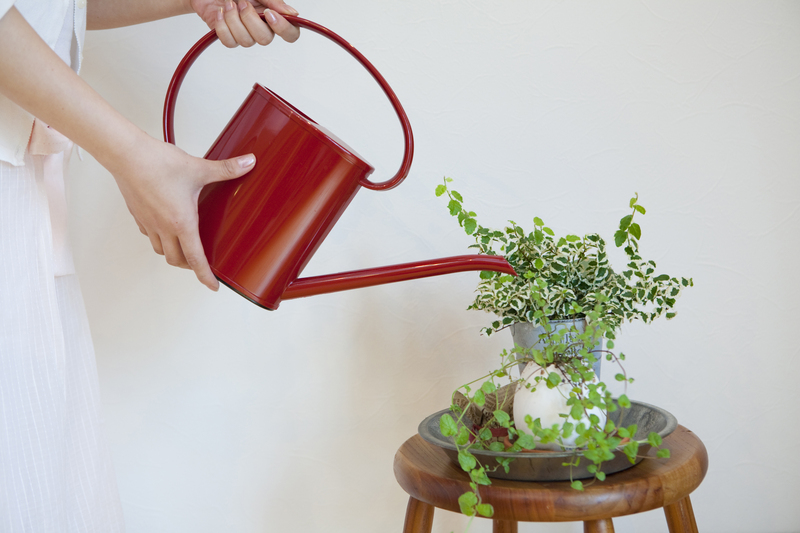Improve Your Gardening Knowledge with 9 Essential Tips for Starters
Posted on 19/08/2025
Improve Your Gardening Knowledge with 9 Essential Tips for Starters
Are you eager to enhance your gardening knowledge and create a lush, vibrant escape in your backyard? Whether you're beginning your very first garden or looking to refresh your skills, these 9 essential tips will guide you on the path to becoming a confident, successful gardener. Dive into practical advice and in-depth information that will transform your approach to gardening and ensure your plants thrive, season after season.
Why Gardening Knowledge Matters for Beginners
Starting a garden is more than just planting seeds in soil. Improved gardening expertise ensures healthier plants, better yields, and greater enjoyment from your outdoor space. As a starter, knowing the basics of garden care saves you time, money, and frustration, setting you up for years of success.
Before You Begin: Assess Your Gardening Goals
- What do you want to grow? (Vegetables, flowers, herbs, or all of them?)
- How much space and time can you dedicate to your garden?
- What is your local climate like?
The answers to these questions will shape your gardening journey. Now, let's explore the nine essential gardening tips for starters that will lay a strong foundation for your outdoor haven.

1. Understand Your Soil
The foundation of any successful garden is its soil. Your soil's quality affects everything--from seed germination to plant growth and harvest yields. Begin by analyzing your garden soil to learn its type and pH values. Most plants prefer slightly acidic to neutral pH (6.0-7.0).
- Test your soil using a simple home test kit or professional service.
- Add organic matter like compost, well-rotted manure, or leaf mulch to improve soil structure.
- Adjust pH and nutrients as needed to suit what you plan to grow.
Healthy soil is teeming with beneficial microbes--treat it well to maximize your garden's potential!
2. Choose the Right Plants for Your Space
Enhance your gardening knowledge by selecting plants suited to your environment. Consider the following:
- Climate: Research the USDA hardiness zone of your location to pick plants that will thrive.
- Sunlight: Most vegetables and flowers need full sun (6+ hours daily); some herbs and leafy greens do well in partial shade.
- Space: Factor in mature plant size to prevent overcrowding.
Look for seeds and seedlings that are labeled "beginner-friendly" or "easy to grow" to kickstart your journey with success and satisfaction.
3. Master the Art of Watering
Proper watering technique is one of the most crucial skills in gardening. Too much or too little water is a common cause of plant issues.
Best Practices for Watering:
- Water early in the morning to minimize evaporation and disease.
- Check soil moisture with your finger--only water when the soil is dry about an inch below the surface.
- Deep watering encourages roots to grow downward and makes plants more drought-resistant.
Use mulch to reduce evaporation and keep soil temperature stable--it's a simple yet effective way to improve your gardening routine.
4. Feed Your Plants Wisely
Plants need more than just water and sunlight--they require nutrients to produce healthy stems, leaves, and fruits.
- Begin with fertile, compost-enriched soil, then top up with a balanced, all-purpose fertilizer as needed.
- Pay attention to specific plant requirements--some, like tomatoes or roses, may need extra feeding.
- Always follow label instructions to avoid over-fertilizing, which can harm plants and pollute the environment.
Investing effort in the right nutrients dramatically elevates your gardening knowledge and results.
5. Practice Pest and Disease Management
Every garden faces pests or diseases at some point. But starter gardeners can manage them with simple, effective strategies:
- Inspect plants regularly for signs of trouble--chewed leaves, discolored foliage, or wilting.
- Encourage natural predators like ladybugs and frogs to keep pest populations in check.
- Use organic solutions such as neem oil, insecticidal soap, or baking soda mixtures before resorting to chemical sprays.
Remember, healthy plants are naturally more resilient, so building strong gardening habits is your best defense.
6. Master the Basics of Pruning
Pruning is essential for plant health, shape, and productivity:
- Remove dead or diseased growth promptly to avoid spreading issues.
- For fruiting plants, pruning can improve yield by directing energy.
- Use clean, sharp tools to make cuts and sterilize between plants to reduce disease.
The more you practice, the more your gardening skills will blossom!
7. Plan for Each Season
Understanding seasonal cycles is key to maximizing harvests and minimizing disappointment:
- Check planting calendars for your area to know when to sow, transplant, and harvest.
- Use row covers or mulch to extend seasons and protect crops from unpredictable weather.
- Rotate crops annually to prevent pests and diseases from building up in the soil.
Seasonal planning turns ordinary gardens into year-round displays of abundance.
8. Keep a Gardening Journal
Documenting your gardening journey is invaluable for improving your gardening knowledge:
- Record what you plant, when, and where.
- Take notes on successes and failures--what thrived, what struggled, what you'd do differently.
- Add photos to track growth, colors, and seasonal changes.
By keeping a garden diary, you create a resource for future gardening seasons, making your experience more productive and enjoyable.
9. Keep Learning and Connecting
Gardening is an ongoing adventure, and knowledge is always growing. Stay inspired and up-to-date:
- Read books and blogs about gardening techniques.
- Join local gardening clubs or online forums--sharing questions and experiences boosts confidence and skill.
- Take courses or attend workshops to deepen your gardening expertise.
Each new growing season is a chance to build on your skills and enjoy even more gardening success!
Bonus: Essential Gardening Tools for Starters
Starting with the right tools can make gardening for beginners smoother and much more enjoyable. Here are a few basics every novice should have:
- Hand trowel and fork - for digging and planting.
- Sturdy gloves - to protect your hands from thorns, soil, and chemicals.
- Watering can or hose - choose based on the size of your garden.
- Pruners - essential for trimming and cutting stems.
- Rake and hoe - for soil preparation and maintaining clean beds.
Invest in quality tools and keep them clean to enhance your gardening journey.

Common Beginner Gardening Mistakes to Avoid
- Overplanting: Give each plant enough space to grow to maturity.
- Neglecting soil improvement: Always start with nutrient-rich, well-amended soil.
- Ignoring watering needs: Learn the specific needs of your plants to prevent root rot or drought stress.
- Planting at the wrong time: Follow guidelines for your climate and frost dates.
- Lack of observation: Regular monitoring helps catch problems early before they escalate.
Avoiding these pitfalls is key to gaining confidence and achieving success as you build your gardening knowledge.
Conclusion: Cultivating Confidence with Essential Gardening Tips
Gardening is a rewarding hobby that celebrates patience, nurturing, and the joy of nature. By following these 9 essential gardening tips for starters, you lay a strong foundation for lifelong gardening enjoyment and success. Take each season as an opportunity to try new plants, refine your techniques, and deepen your understanding of the green world around you.
With fresh knowledge and the right guidance, even beginner gardeners can develop lush, beautiful gardens and enjoy the health and happiness that growing plants bring. Remember, every great gardener started as a beginner--so dig in, keep learning, and watch your skills--and your garden--thrive!
Start your gardening adventure today and unlock a world of natural beauty and personal satisfaction!
Latest Posts
Building a Magical Garden Adventure for Children
How Sustainable Gardening Helps Fight Climate Change
Design a Tranquil Outdoor Haven with 5 Low Maintenance, Budget Ideas
The Symphony of Hedge Trimming: Dive into Shapes and Techniques

